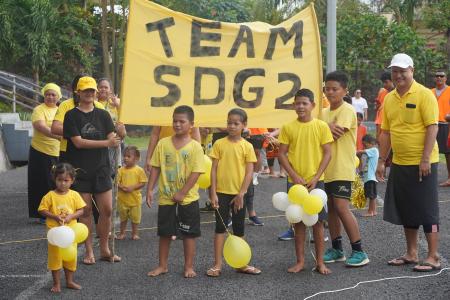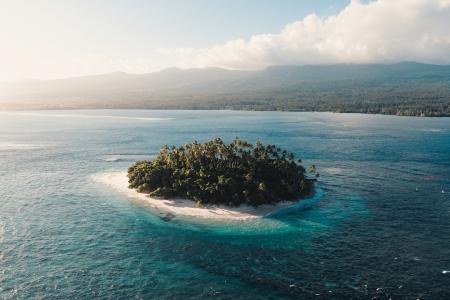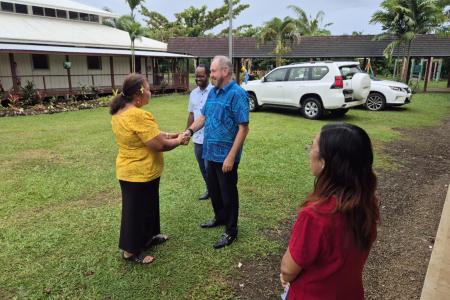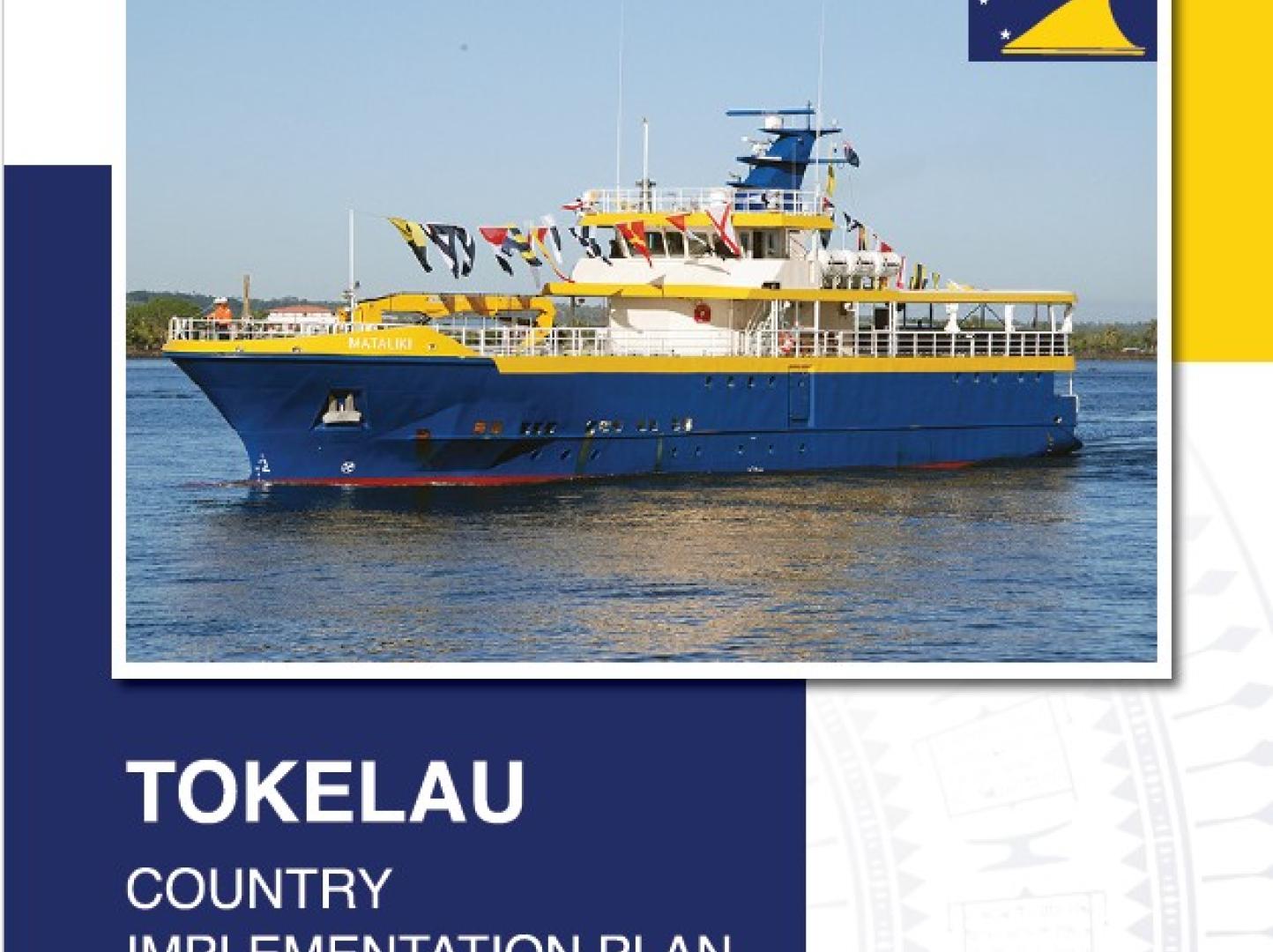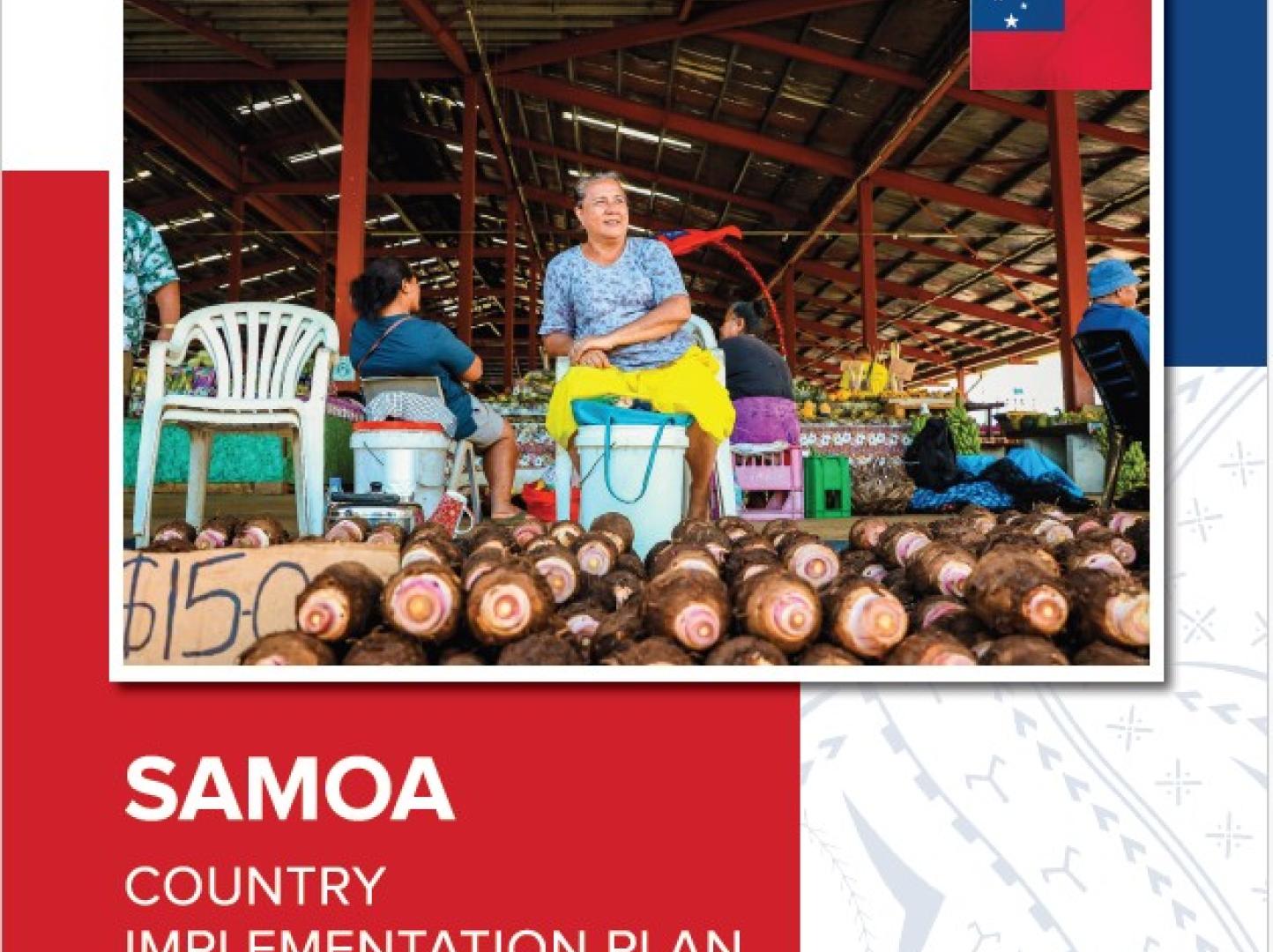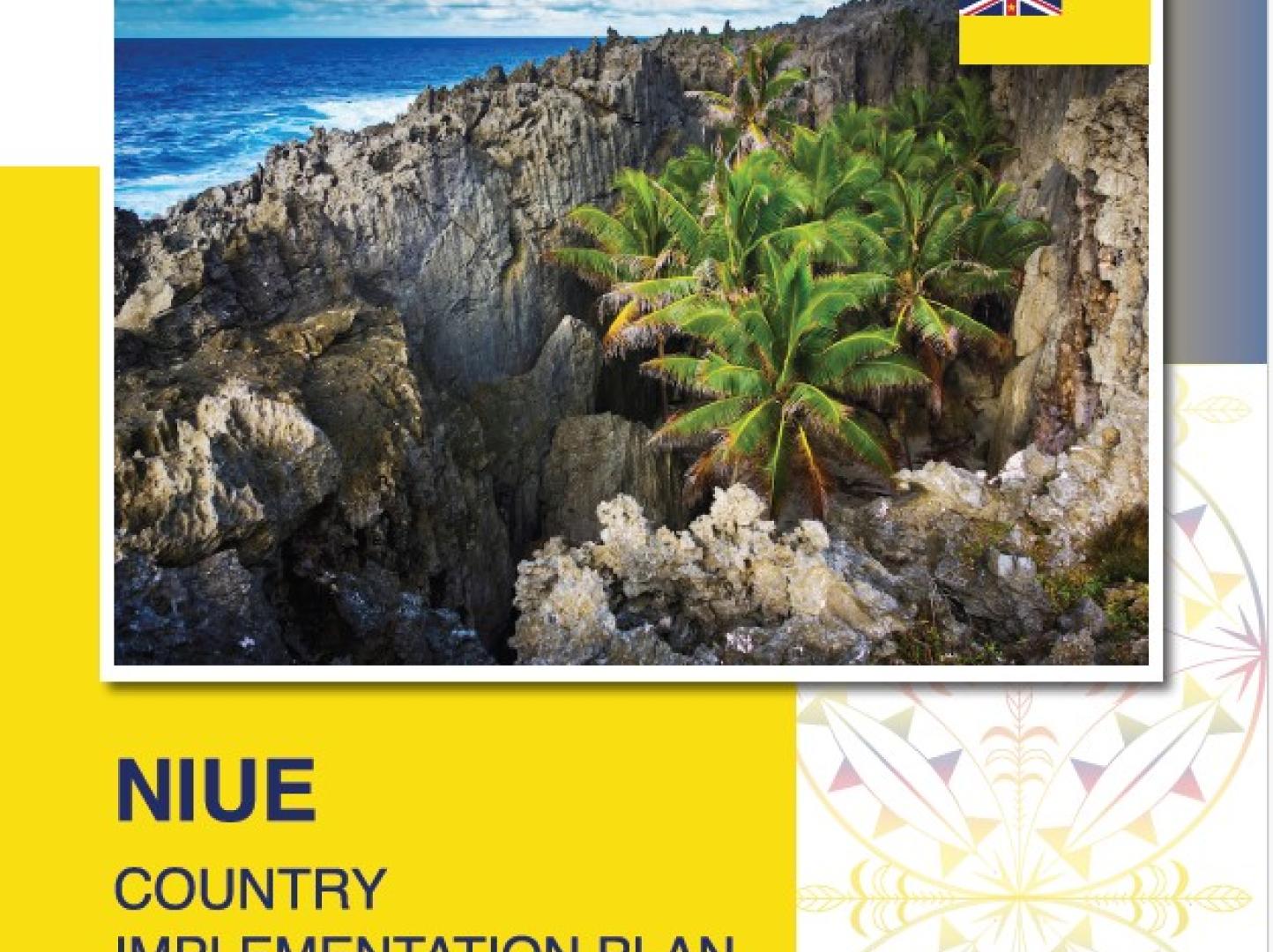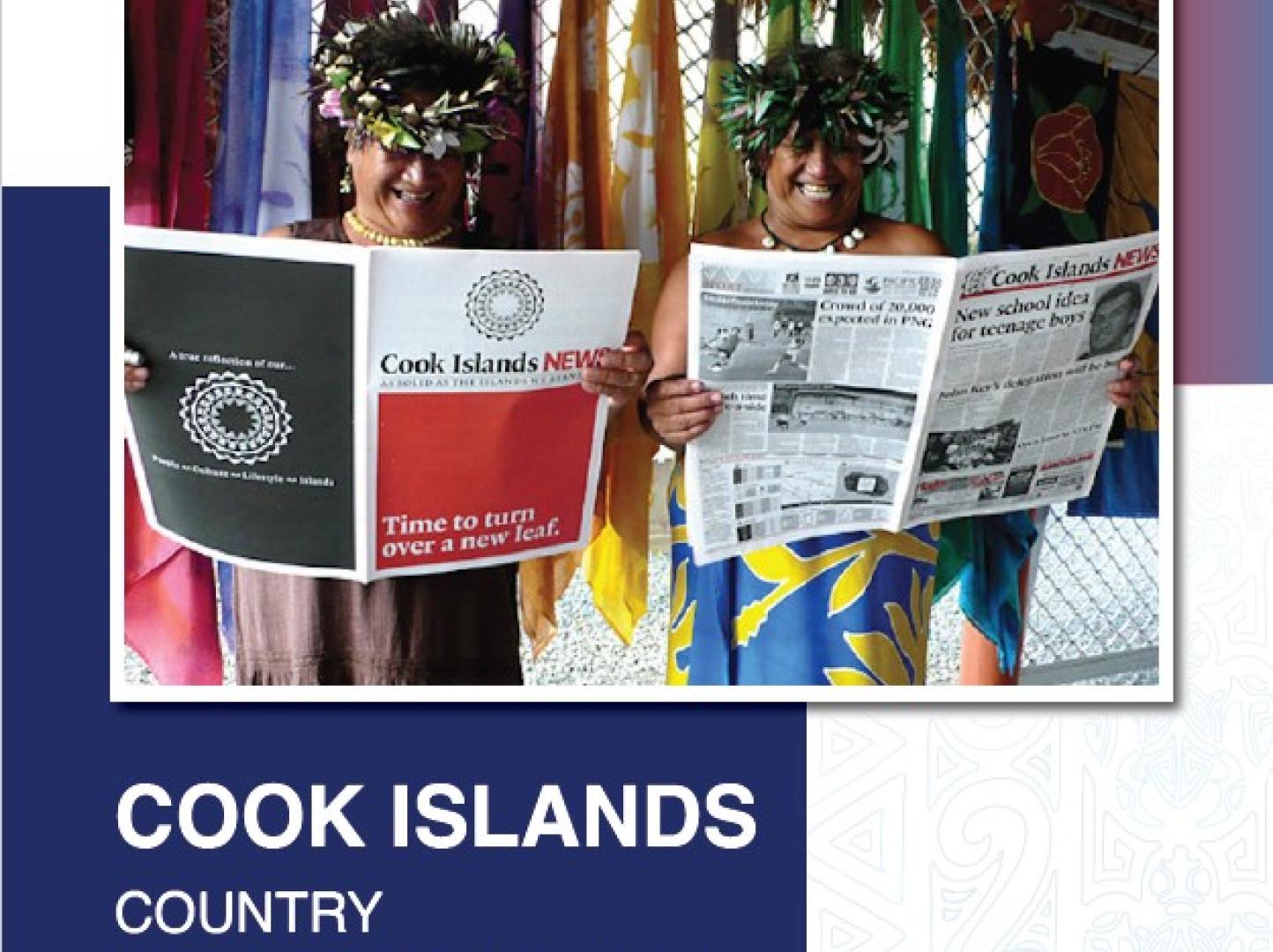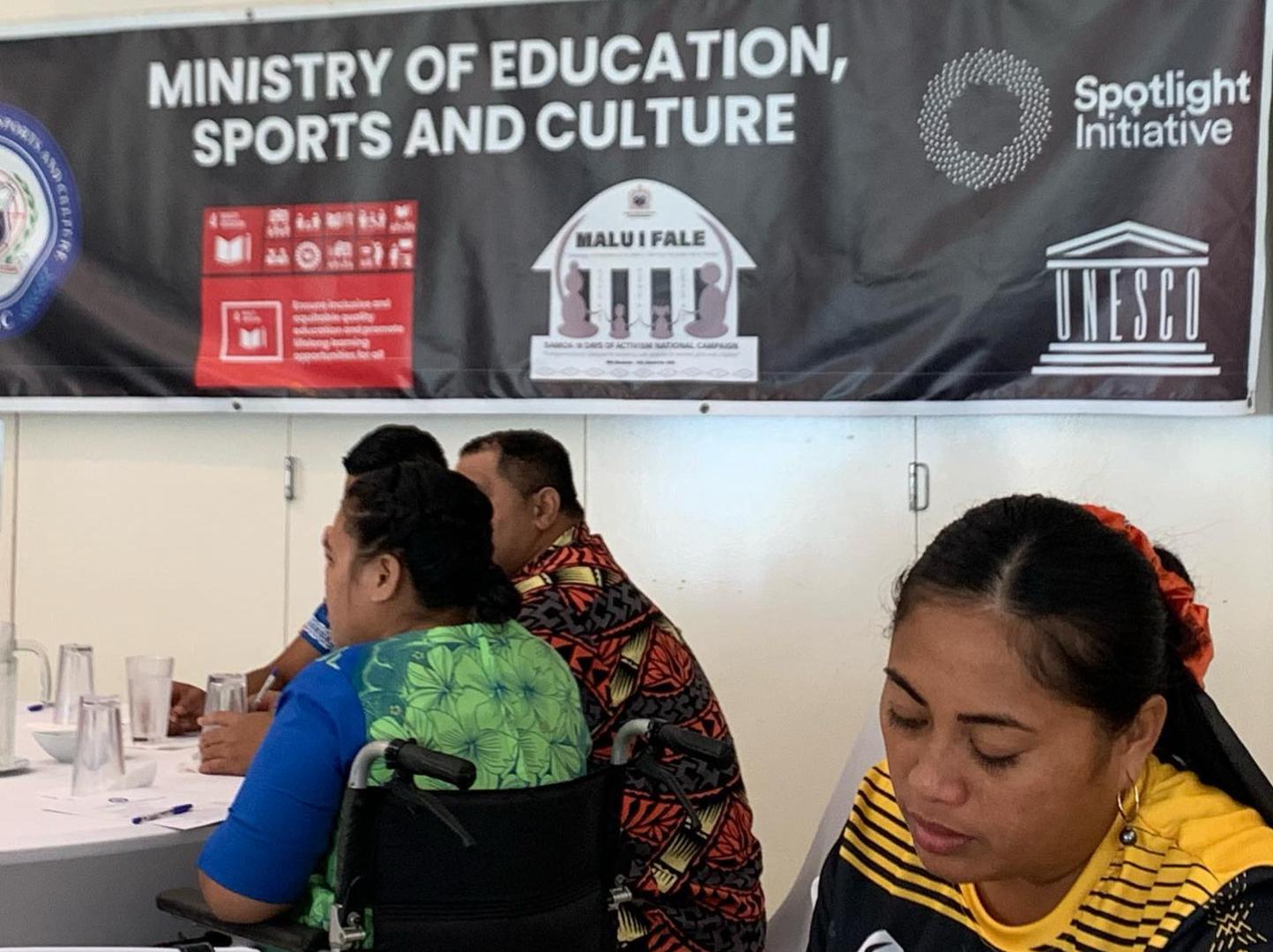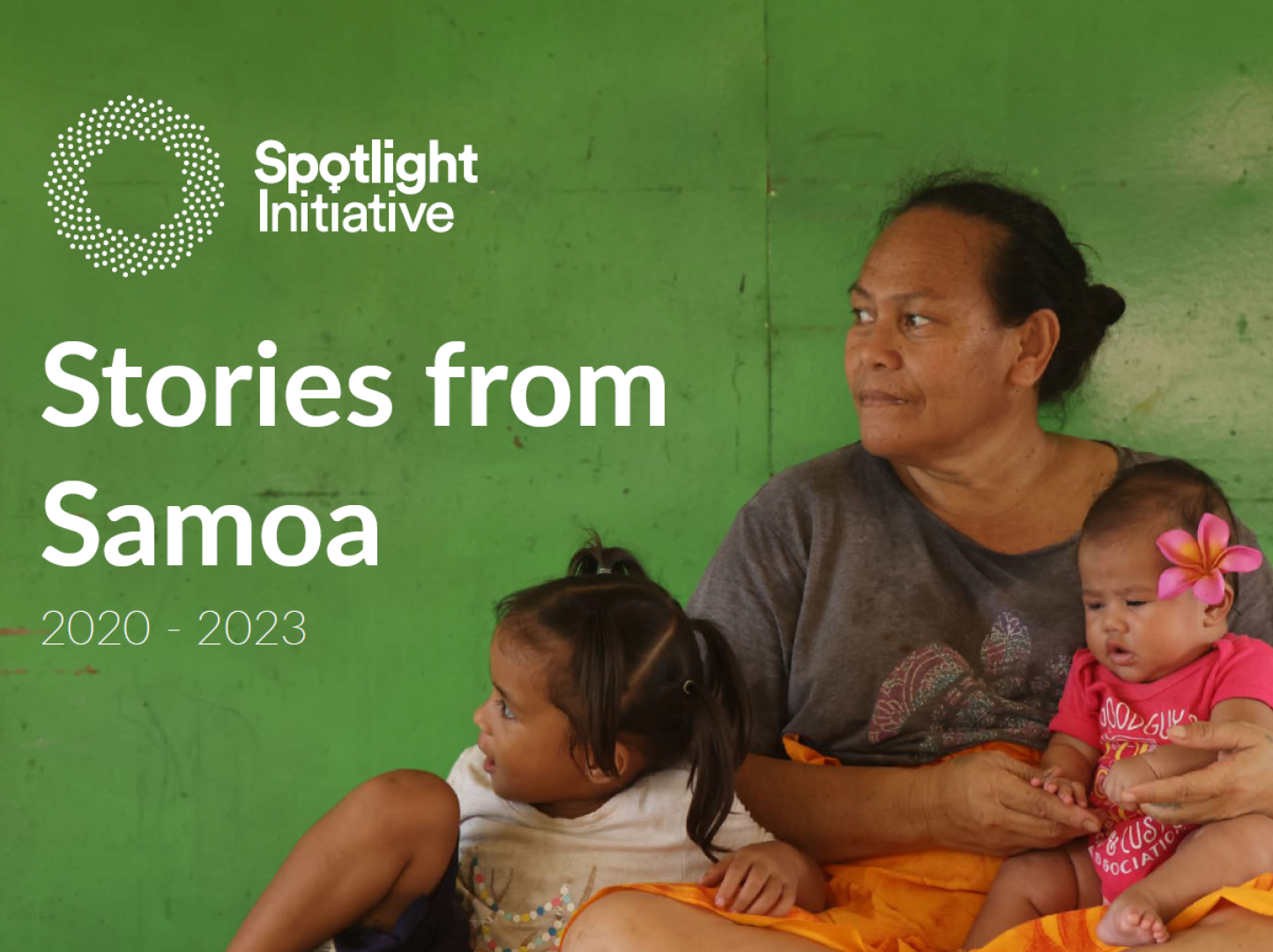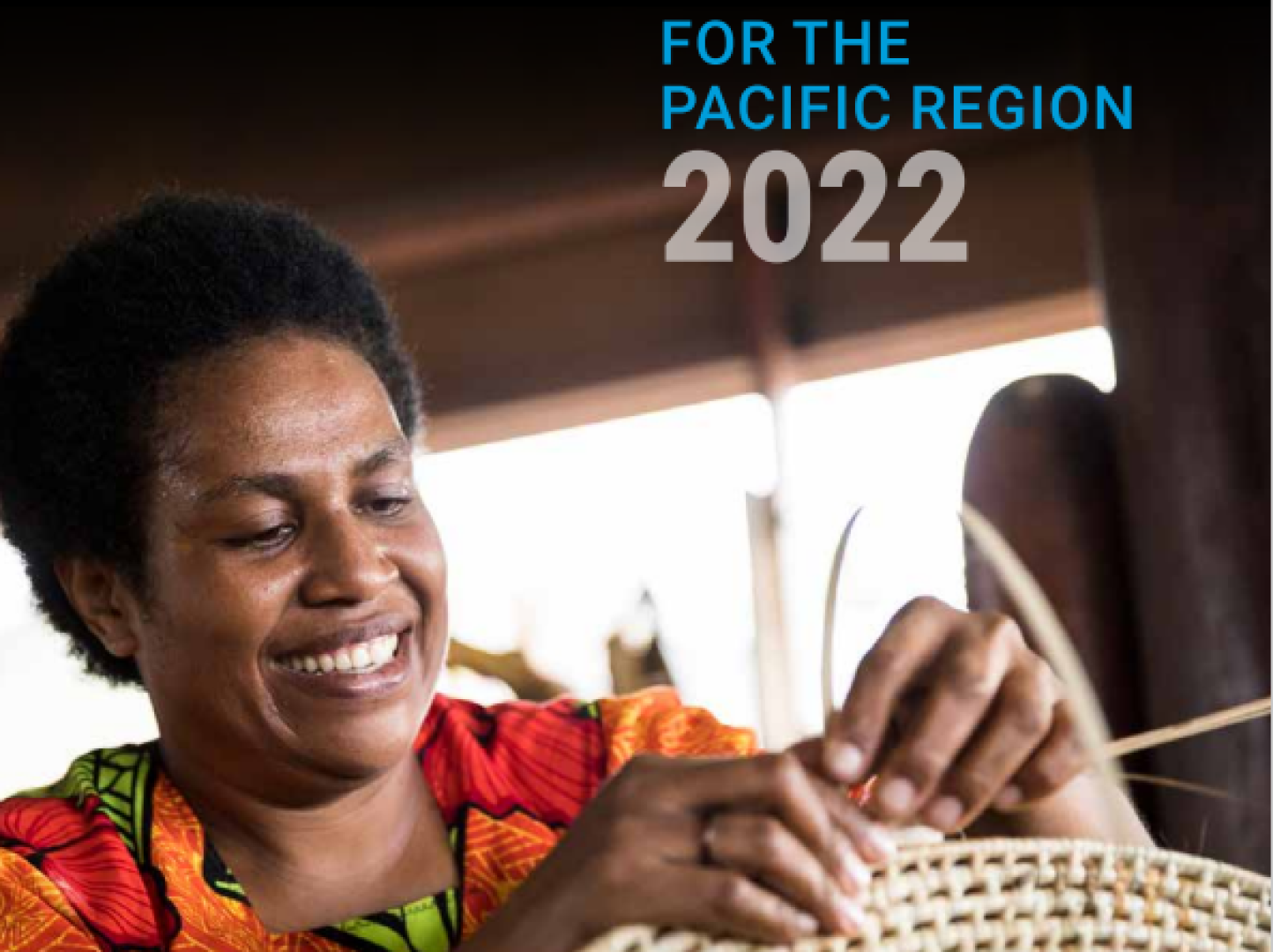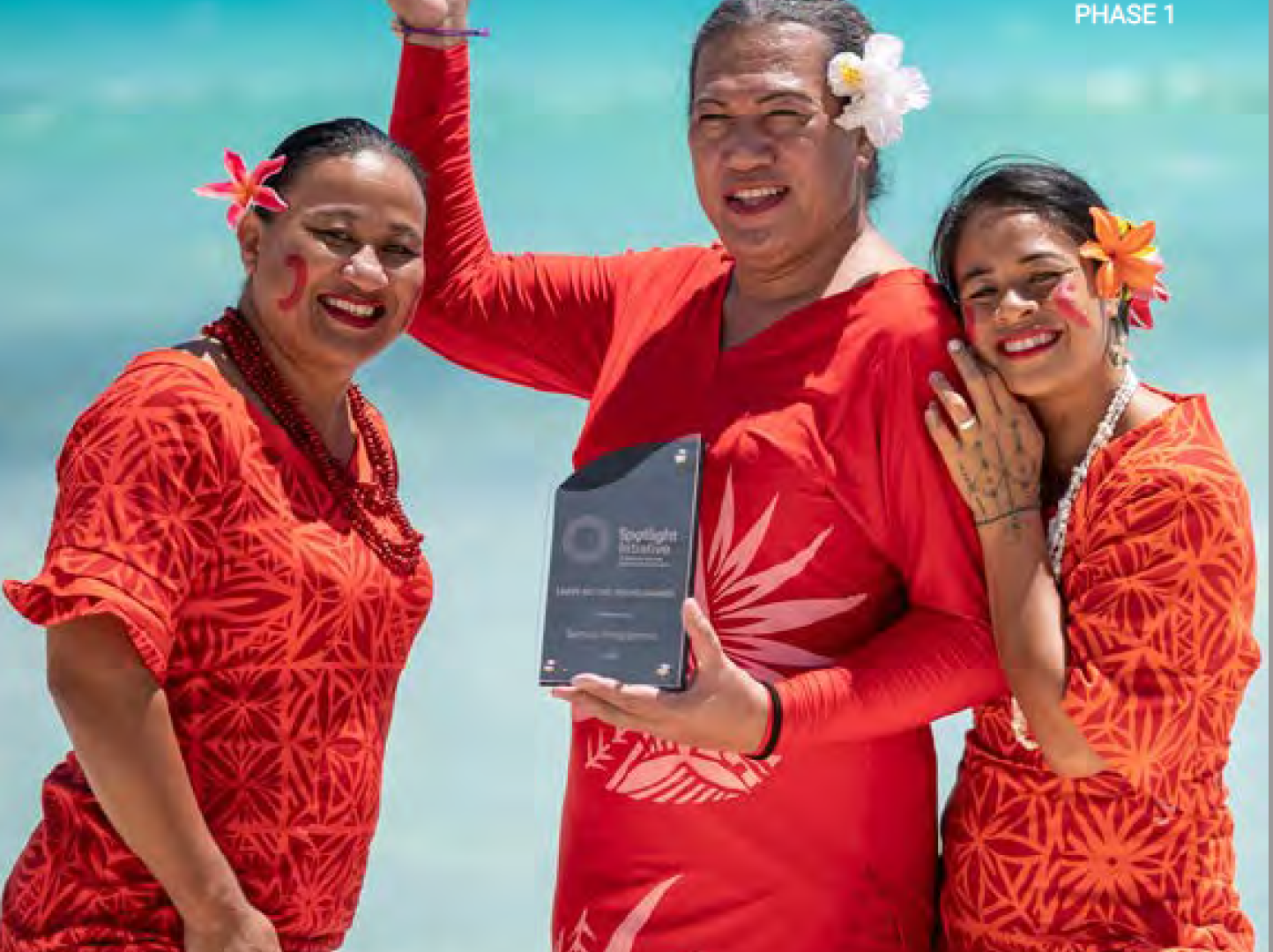Latest
The Sustainable Development Goals in Cook Islands, Niue, Samoa and Tokelau
The Sustainable Development Goals are a global call to action to end poverty, protect the earth’s environment and climate, and ensure that people everywhere can enjoy peace and prosperity. These are the goals the UN is working on in Samoa:
Story
12 September 2023
The 2023 UN SDGs Summit – What does it mean for ordinary Samoans?
Come next week, Prime Minister of Samoa, the Honorable Fiame Naomi Mataafa will take a stand at the United Nations Sustainable Development Goals (SDGs) Summit in New York, as one of the leaders of the 193 member states of the UN, to proclaim Samoa’s commitments as a nation, towards accelerating the implementation of the SDGs.
Taking place on the 18th and the 19th of September at the UN headquarters in New York, this is a crucial convening, considering the setbacks in the implementation of Agenda 2030 (the SDGs).
Ahead of the UN SDGs Summit, the Government of Samoa with the UN Country Team in Apia recently held a national consultation on the SDGs. Samoa is the second country in the Pacific region to host such a significant consultation, and this is a vital step in its preparations for the Summit.
It is a remarkable demonstration of the government's unwavering dedication to achieve the SDGs, and these SDGs are embodied in the Government of Samoa development aspirations to foster harmony, safety and freedom for all its people. The SDGs resonates with Samoa’s development priorities to foresee the creation of communities that are empowered and resilient and to inspire growth. On the other hand, Samoa’s national development contributes to the SDGs underlying aspirations of a world where people live in peace and enjoy prosperity from a planet that is safe and protected.
As we reach the halfway point towards achieving the SDGs by 2030, the UN, in collaboration with member countries, is conducting a comprehensive evaluation of progress and challenges. The COVID-19 pandemic has severely impacted SDGs’ achievements. The recent SDG Progress Report shows that just 12 percent of the SDGs are targets are on track. Progress on 50 per cent is weak and insufficient. Alarmingly, we have stalled or gone into reverse on more than 30 per cent of the SDGs, globally.
Assessing Samoa’s implementation progress against the SDGs targets and its aligned national development strategy is therefore of paramount importance to the people of Samoa.
At Samoa's national SDGs consultations held on the 5th of September, the government presented its 2020 VNR, which highlighted both progress and challenges. The pandemic disrupted income generation, increased poverty, violence against women and children, food insecurity, and mental health issues. Samoa’s GDP fell by over 9 percent. These insights underscore the need for strategic investments to reignite progress on SDGs.
In a context where the needs are abundant and resources are constrained, it is important to consider prioritization of key investments that would have the most positive spillover effects on other areas of need.
Based on the UN’s analysis and the discussion at the national consultation, Samoa should consider prioritizing investments in food systems, job creation, social care, biodiversity and climate change. These investments not only address key challenges but also yield positive effects, including reducing violence against women.
It is crucial for citizens to understand the implications of these decisions and actively engage in national development planning and SDGs policy discussions. The SDGs Summit provides a platform for governments to showcase their commitments, and it is where we can gauge whether these commitments will reverse the negative trajectory before 2030. The implementation of these commitments will require partnerships with all stakeholders and ordinary citizens also have an important role to play in the realization of the SDGs.
Now let’s turn back to what the SDGs are all about. The 17 SDGs embody the aspirations of global leaders for a world marked by peace, equality, and prosperity for all, regardless of gender, religion, ethnicity, race, age, nationality, sexual orientation, geographical location or any other differences.
The SDGs provide a shared blueprint for peace and prosperity for people and the planet. They provide benchmarks for realizing this vision and serve as a basis for dialogue between governments and their partners on development cooperation.
Crucially, the SDGs underpin regional development strategies such as the 2050 strategy for the Blue Pacific continent as well as national development strategies, ensuring that the pursuit of regional and local goals aligns with global priorities.
Samoa’s commitment to realizing Agenda 2030 is evident since it is one of the few small islands developing states (SIDS) that have submitted voluntary national reviews (VNRs) on SDGs achievement. By expressing its dedication to present its third VNR in 2024, Samoa aims to be among the few countries worldwide actively participating in this reporting process.
But how much does the average Samoan citizen fully understand about the value and significance of the SDGs and the upcoming SDGs Summit?
That is crucial.
The 2019 survey by the World Economic Forum (WEF), tells us that the global awareness of the SDGs is relatively high, with 74 percent of adults being aware of them. Nonetheless, awareness levels vary significantly from country to country.
There is a significant opportunity to raise awareness among Samoans about the importance of the SDGs, what they represent, and their relevance to daily life, and the United Nations is willing to partner and provide this support as relevant and resourceful as needed.
Themba Kalua, UN Resident Coordinator - Samoa, Cook Islands, Niue, and Tokelau
1 of 5
Story
06 September 2023
Act now and act together to progress the 17 Goals.
Eight years ago, world leaders of the United Nations’ member states, were bold and adopted a set of 17 Sustainable Development Goals (SDGs).
These 17 goals whilst complex and ambitious, when combined would help us realise a world where no one is left behind.
A world where life is fulfilling with just governing systems, where everyone enjoys good health, are well-educated and earns sufficient income. A world where food is abundant and nutritious, the cost of energy is affordable and the environment is safe and protected.
In the heart of such a world, are people that are safe and resilient to adapt and thrive, no matter what shakes the core of their existence.
But that dream of such a world through the 17 SDG to come true by 2030, is not progressing as expected.
Earlier this year, the UN Secretary General Antonio Guterres expressed his grave concerns on SDGs achievement; “Halfway to the deadline for the 2030 Agenda for Sustainable Development, we are leaving more than half the world behind.”
“The SDG Progress Report shows that just 12 per cent of the Sustainable Development Goal targets are on track. Progress on 50 per cent is weak and insufficient. Worst of all, we have stalled or gone into reverse on more than 30 per cent of the SDGs.” “Unless we act now, the 2030 Agenda will become an epitaph for a world that might have been.”
The call to act now and to act together, moved the UN Country Team in Samoa to immediately convene national SDG consultations with the countries they serve including Cook Islands, Niue, Samoa and Tokelau, in response to the UN SG’s concerns on lack of SDGs progress.The UNCT Samoa in collaboration with Samoa’s Ministry of Foreign Affairs and Trade coordinated the Consultation bringing together the members of Samoa’s SDGs Taskforce and the UN at the Lava Hotel on Tuesday 5th of September, 2023.
The Chief Executive Officer of the Ministry of Foreign Affairs and Trade Peseta Noumea Simi reiterated in her official remarks at the opening of the Samoa SDG Consultation that accelerating progress of the SDGs requires robust approaches, collective and meaningful engagement of all partners. She added that this consultation is important because it enables genuine dialogue on Samoa’s efforts to localise the SDGs, and their integration and implementation through government’s national development priorities.
The UN Resident Coordinator Themba Kalua acknowledged the leadership of the Government of Samoa and their commitment to fast track progress of the 17 SDGs goals, whilst emphasising that the ‘UN is very clear that the focus of SDGs acceleration efforts is entirely up to the Government of Samoa.’
Available indicators shows that the major challenges with SDGs progression for Samoa appears to surround the advancement of gender equality, reducing hunger, protecting life on land, and stimulating decent jobs and growth.
Mapping Samoa’s SDGs challenges to the UN’s six areas for SDGs acceleration, and considering the SDGs interlinkages, suggests emphasis on investments in food systems, social protection and jobs, and biodiversity and nature to spur catalytic SDGs progress in Samoa.
A UN Policy Brief concluded that it would cost Samoa approximately 16% of its GDP per year to achieve this, if it intended to progress all of its SDGs targets by 2030.
Noting that the costs for SDGs achievement seemed unrealistic, a key recommendation following the UN’s discussion with the SDGs Taskforce was for the government to also focus its SDGs acceleration efforts on health and education, particularly given the high rates of NCDs and the shortage of labour on island being exacerbated by seasonal employment schemes.
The Taskforce also stressed that the private sector and civil society should not be left behind in these discussions and decisions on the SDGs, given that such discussions are at the foundation of the key messages that Samoa will articulate at the global SDG Summit in later this month.
Samoa completed its second Voluntary National Review of the SDGs in 2020 and is preparing for its third, which should be ready for circulation in 2024
1 of 5
Story
18 September 2023
Prime Minister of Samoa Addresses 2023 SDG Summit
The Secretary-General met with H.E. Ms. Fiamē Naomi Mata’afa, Prime Minister of Samoa. He welcomed Samoa’s chairmanship of the Alliance of Small Island States and emphasised that women and youth are on the frontlines of the climate fight and must play a role in decision-making and governance. The Secretary-General and the Prime Minister exchanged views on the need to scale up international support for Samoa’s development and financing needs, particularly climate resilient infrastructure, coastal and marine conservation and restoration and human capital formation. The Secretary-General also commended Samoa’s leadership in advancing the work towards a Multidimensional Vulnerability Index (MVI) and Loss & Damage fund, expressing the full support of the UN system to that end.
New York, 17 September 2023
1 of 5
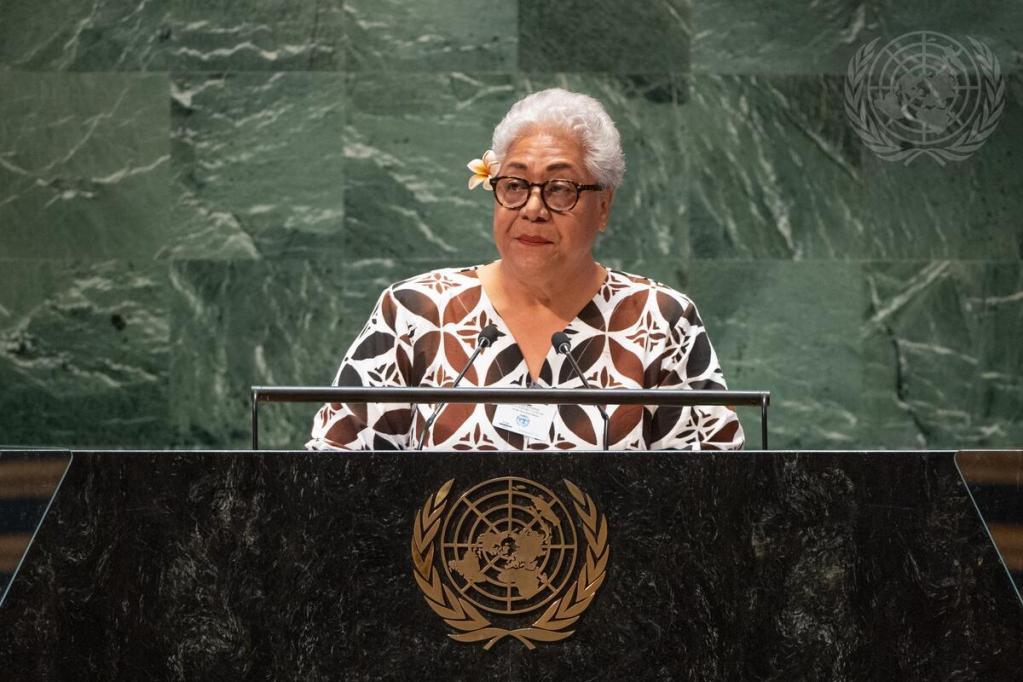
Story
10 April 2023
Pam, driving the vehicle of change for community women movements.
Fuatino Pam Sua or affectionately known as ‘Pam’ first became involved in the business of the Samoa National Council Women (SNCW), simply by being the driver for its founding President, Masiofo Fetauimalemau Mataafa.
In 1972, I was sent home after schooling in New Zealand. While in NZ, I taught myself how to drive.
Thankfully, it was my driving skills that the late Masiofo Fetauimalemau, called me to drive her around and do the bidding of the old ladies of the SNCW, taking them to meetings and so forth.
I enjoyed the driving because I also got to sit in, listen and understand the governance and operations of the Council. Most important was the relationships with the old ladies and the knowledge and wisdom shared amongst them that I even learnt so much from it.
Some years later, Pam was assigned the role of managing the SNCW finances.
Fast forward to 2012, just before Samoa’s celebration of its independence, Pam was organizing lunch and making transportation arrangements for the SNCW members from Savaii and Upolu.
I was about to leave, but the Hon. Fiame Naomi, the daughter of the late Masiofo Fetauimalemau and the President of the SNCW called me over and said, “before you leave, you’ve just been appointed the new secretary”.
That day my responsibilities multiplied. I am in charge of managing the organization and trying to live up to the expectations and vision of the Samoan matriarchs that came before us and paved the way for the women’s movement in Samoa for generations that followed.
Pam is at the heart of mobilizing and uniting women from the villages around Samoa under the umbrella of the SNCW and she was involved for over fifty years.
The SNCW was set up in 1953 and is an umbrella organization for village women’s committees in Samoa. The SNCW is premised on the value of Samoan women’s traditional statuses and social standing, namely ‘Sa’o Ao (daughters of village men and women), faletua ma tausi (wives of paramount chiefs and orators), and āvā a taulele’a (wives of untitled men).
This social group plays an integral role in supporting the village’s local governance with its developments and advocacies filtering across to the other influential players of the village, namely, the village council, untitled men and the youth.
In 2015, the SNCW embarked on an institutional strengthening programme to redefine its purpose and review the organization’s constitution and to explore whether its purpose and existence was still relevant. At the time, the SNCW was a member of the CRC and CEDAW Partnership Committees coordinated under the Ministry of Women, Community and Social Development (MWCSD). One of the key development issues requiring a whole-of country approach, was family violence.
The SNCW received funding from the Government of Australia to fund the Samoa Shaping Women’s Development programme through MWCSD to implement a nationwide advocacy campaign on the prevention of violence against women and girls using traditional learning methods through the art of community conversations.
Spearheaded with technical assistance from Palanitina Tupuimatagi Toelupe, 41 villages were covered, and we collaborated with the women’s committees, women’s church fellowship, including youth groups to deliver this advocacy with the hope that the women themselves will drive their own destiny and facilitate social change through this movement.
This community-centered programme was our steppingstone into reviving our focus on ending violence against women and girls (EVAWG) and linking it to good governance and leadership.
Building on from the momentum in 2015, the support from the EU & UN Spotlight Initiative in 2020 has elevated this work with 16 women’s committees from Upolu and Savaii engaging and joining in the movement. The Spotlight’s involvement added weight to the community conversations to strengthen the advocacy of eliminating violence against women and girls. And the Spotlight focus was through leadership programmes to empower the women’s committees to gain confidence as they are the gatekeepers of what is happening within their own communities.
Contextualized trainings were offered to women members of the SNCW on EVAWG using the transformational leadership tool to advocate and disseminate the information and learnings to women in their villages to address violence against women and girls including intimate partner violence.
Our training content and practical exercises worked on confidence and advocacy building within their own women’s committee settings and when advocating for support from the village council of chiefs. For instance, they were reminded through the programme to remember and understand the order of the Alii ma Faipule – village council of chiefs. There was nothing worse than coming in only just to be chased out.
The Spotlight Initiative programme was well received, the lessons learned, and the work of the trained women was effective to create awareness and advocacy for other committees to grow the need and the urge to be part of the SNCW.
A testimony from Mrs Vine Sefo Samia, Samatau Council Women, participant in the SNCW leadership trainings – Spotlight gave us the tools to run our own advocacy activities in the village reaching all age groups, especially the young men and women, who have a better understanding than before.
We visit families and encourage mothers to not be afraid to speak out and seek help. We encourage open communication and dialogue between the mothers and their daughters on sexual reproductive health and rights of women and girls, and how to prevent sexual and physical violence. We lobbied for leadership and good governance support from our Alii and Faipule and church ministers which led to having in place village policy and laws to address violence against women and girls, we remind the families and fathers about their duty to protect and keep the peace in the village.
Conversations are being made, collaborations amongst the traditional structures of the village and women have been made stronger. We do not see nor hear of any new incidents of violence these are the good changes that have come about due to the strong advocacy by the women of the Samatau council. We cannot afford to be complacent, we have to continue the advocacy as we are the Spotlight champions in our village to effect the change in norms, attitudes and behavior to end violence.
The leadership training was to advance the work we had already started and become self-reliant to not wait for handouts but to stand up and lead from the home and from the community, to be caregivers and oversee their communities and the issues that pertain to women and girls. This all tied in when in times of crisis especially when the measles epidemic hit Samoa in 2019, the committees mobilized into action in terms of ensuring sanitation and caring support to prevent the spread of measles amongst our most vulnerable groups, our children.
The Spotlight Initiative-UNDP partnership with SNCW dovetailed into the community conversation programme and expanded it.
The leadership programme under Spotlight allowed the committees of women and girls to flourish and build confidence in themselves to such a degree it enabled them to lobby, speak out and empower the traditional village setting to listen and consider their needs and issues.
Women and girls must lead from the front, because they are the ones who understand what is needed and to collaborate with each other, amplify and complement each other’s work. They have the capacity and know how to carry out their work and the leadership programme through the Spotlight Initiative brought about the change in confidence and know-how to be the voice for women, girls, and children.
We utilized the Samoan ways and tools we have in place to put a focus on bringing to light the violence against women, girls and children and advocating for a better change.
"As you witnessed, our perseverance bore fruit with the President of the SNCW becoming the first woman Prime Minister for this country.”
The rest is history.
This story has been rewritten from its original form as published in the Spotlight Initiative Magazine 2022 | Stories of Change.
1 of 5
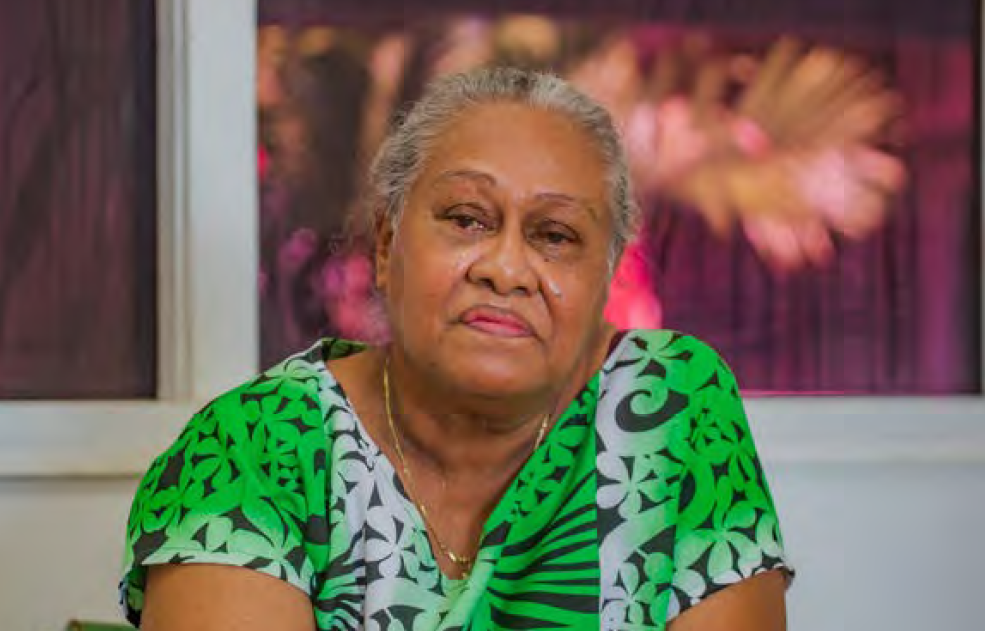
Press Release
27 April 2023
UNDP Samoa Accelerator Lab wins global Japan SDG Innovation Challenge
Apia, Samoa – In a first for Samoa, the United Nations Development Programme (UNDP) Accelerator Lab (AccLab) has won one, of only two spots, for the Japan SDGs (Sustainable Development Goals) Innovation Challenge. Samoa and Zimbabwe are the only AccLabs selected from a pool of 91 UNDP AccLabs across the world. The Challenge will enable the UNDP Samoa AccLab to implement an innovative project to convert fish skin into sustainable fish leather.
This project aims to maximize the economic benefits of the entire fish caught, instead of just the flesh whilst discarding other fish parts, thus lending the project its name: “100% Fish Use”. The fish leather will be manufactured through a sustainable process. The eco-friendly fish leather is an exotic leather and will be an addition to the existing Samoan handicrafts/products such as wallets, business card holders and other items, popular as souvenirs. There is also a huge demand for fish leather overseas and this has the potential to increase additional avenues for export.
The United Nations Development Programme (UNDP) AccLab is partnering with Think Sea Corp, a Japanese company, to implement this project through funding from the Japan Cabinet Office (CAO). This Challenge is facilitated by the Japan Innovation Network. The contract between UNDP Samoa and Think Sea Corps was signed in March 2023 and the project is now ready for implementation.
“Over 40 to 60% of the caught fish is currently being dumped or underused. Furthermore, there is very little data on the amount of fish waste generated in Samoa. This project, in addition to assigning economic value to fish waste, will also boost the data on fish waste,” said Jorn Sorensen, Resident Representative, UNDP Samoa.
The founders of the Think Sea Corp will spend two months in Samoa to experiment with the fish skin type available locally and create samples of leather. They will also train the target communities on the low-cost process of leather production, enabling communities to take up new entrepreneurial opportunities of producing, utilizing, and selling fish leather.
"We are thrilled to embark on this project to contribute to the protection of the marine environment and sustainable development with the team at UNDP Samoa. As awareness of the importance of marine conservation continues to grow, we take great pride in being able to support sustainable economic development while making use of ocean resources. Through this project, we hope to make valuable contributions to the local communities by leveraging our respective expertise and skills to pursue meaningful impact,” said Tomohisa Noguchi, Founder, Think Sea Corp.
The 100% Fish Use project is a critical milestone for Samoa not only in terms of expanding the blue economy, but also a successful example of connecting technology and innovation from the private sector to local contexts, accelerating progress on the SDGs.
-ENDS-
For media queries, please contact:
Tomohisa Noguchi, Think Sea Corp, totoleather@gmail.com, https://www.tototoleather.com/en
Laufaleaina Lesa, UNDP Multi Country Office, Samoa|Tel. +685 23670|E: laufaleaina.lesa@undp.org
www.ws.undp.org @UNDP in Samoa, Cook Islands, Tokelau & Niue @undpsamoa
1 of 5
Story
17 February 2025
Cook Islands Leads the Way in Shaping UN Development Support.
In the Cook Islands, sustainable development is about preserving a way of life, the unity of families and communities; and ensuring a safe and prosperous future. Earlier in February this year, the United Nations (UN), led by UN Resident Coordinator Themba Kalua, travelled to the Cook Islands to convene a dialogue on sustainable development, most importantly to listen and truly understand where UN support is most needed. Joined by the Director of the International Labour Organisation (ILO) Office in the Pacific, Mr Martin Wandera, the Chief of Mission for the International Office for Migration in the Pacifi,c Mr Solomon Kantha, the Resident Representative of the UNDP, Ms Aliona Niculita, with representatives from the FAO Ms Demelza Wilkes, Ms Sara Sua of the UNFPA and Mele Mauala of UN Women, the mission was a reaffirmation of partnership, a commitment to ensuring that the UN’s work is guided by the voices and needs of the Cook Islands people. At the centre of the dialogue was the Country Implementation Plan (CIP), a strategic framework that directs UN interventions across key areas such as climate resilience, economic growth, social development, and governance. With 14 UN agencies actively engaged in the Cook Islands, the consultation aimed to refine and strengthen this roadmap, ensuring that every initiative is targeted, resourced, locally driven and will yield transformative results.On the day of the dialogue, the Hon. Tinga Elekana, Minister of Foreign Affairs and Immigration, set the tone by emphasizing that success is not in the words of the CIP, but the actions that we take throughout its implementation timeframe. The Cook Islands faces a unique set of challenges, from the increasing threats of climate change to economic vulnerabilities linked to its small size and geographic isolation. Yet, it is a nation with a strong vision for its future, one that prioritizes sustainable development, environmental stewardship, and the well-being of its people. For the UN, supporting this vision requires more than just resources; it demands collaboration, adaptability, and a deep understanding of the local context.Under Themba Kalua’s leadership, the UN has taken a proactive approach, ensuring that its presence in the Cook Islands is meaningful and responsive. “Our joint efforts are crucial to accelerating progress toward the SDGs, and we remain committed to working closely with national stakeholders to ensure that no one is left behind,” Kalua stated. By April this year, the UN aims to finalize an even stronger, more targeted CIP, one that reflects the priorities of the Cook Islands and ensures that development efforts leave a lasting impact.Guided by the people of the Cook Islands, the UN is set to deepen its commitment, walking alongside the nation in its pursuit of a sustainable and prosperous future.
1 of 5
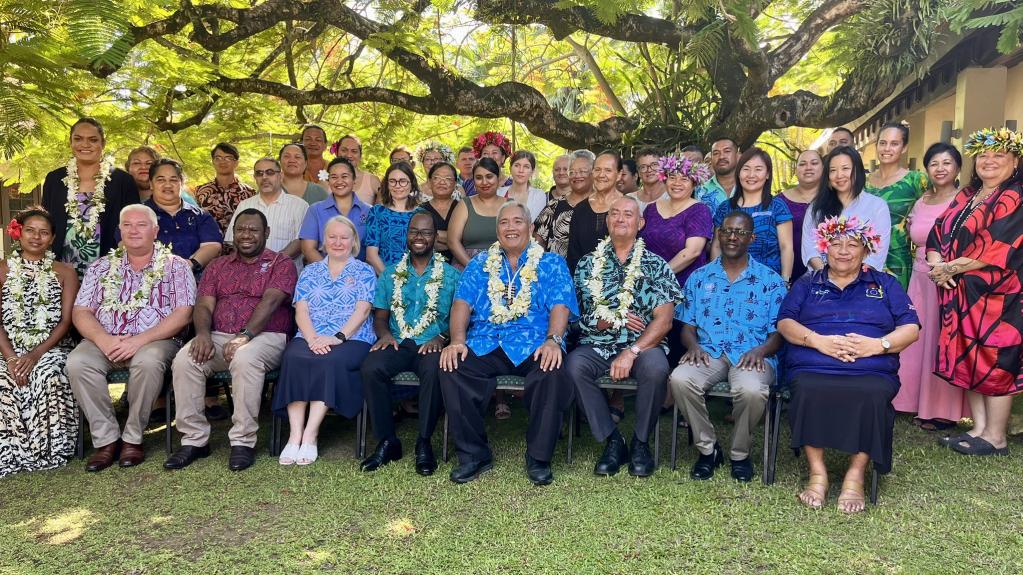
Story
10 December 2024
Human Rights Day Celebration
Lau Susuga ile Ta’ita’I ole Sauniga, Lau Susuga Dr. Latū Latai.
Lau Afioga ile Fofoga Fetalai ole Palemene o Samoa, Lau Afioga Papalii Li’o Taeu Masipa’u.
Lau Afioga ile Komesina o Sulufaiga, lau Afioga Maualaivao Pepe Seiuli, faapea le Ofisa ole Komisi o Sulufaiga.
Talofa lava! Malo le soifua manuia!
Ole Aso Fa’apitoa lenei mo le fa’atā uaina, o Aiā Tatau faale tagata soifua.It is an honour to be with you on behalf of the UN Resident Coordinator, as we gather to celebrate the Human Rights Day.
Today, we reaffirm our commitment to the values and principles of the Universal Declaration of Human Rights, adopted 76 years ago. This declaration remains a powerful testament to our shared humanity. It reminds us that human rights are not privileges, but fundamental guarantees for every person and every community, everywhere.This year's theme "Our Rights, Our Future, Right Now" is a call for action. It emphasizes that the human rights we uphold today are the foundation upon which we build our future. It challenges us to act with urgency, recognizing that the time to secure our future is now.In Samoa, and across the Pacific, we face unique challenges that threaten our rights and our future, demanding collective and immediate action.
This includes climate change, which is a pressing issue that disproportionately affects our region. It is not just an environmental challenge, but a human rights one. Rising sea levels, extreme weather events, and the loss of biodiversity threaten our right to a safe, healthy, and sustainable environment.
We must ensure that people have access to information about climate change and environmental harms and how they impact their lives so that they can participate in decision-making processes and take action at all levels.
Indeed, education, awareness and critical thinking are essential for an informed, resilient and inclusive society. The United Nations looks forward to supporting the Government of Samoa to realize its “human rights pledge” to introduce climate change education in schools.
Strong democratic institutions that uphold the rule of law are crucial to guarantee human rights, including the right to a clean, healthy and sustainable environment.This includes an independent judiciary to ensure that laws are applied fairly to all and that the rights of vulnerable and marginalized are protected; a legislature which ensures that laws are complaint with the government’s international human rights obligations and sufficient resources are allocated for the promotion and protection of human rights; and an executive which ensures that government agencies and officials comply with human rights standards.
These issues were discussed in depth in October at the Commonwealth Human Rights Forum organized by the Samoa Office of the Ombudsman.In her opening remarks, the Prime Minister of Samoa, Honorable Fiame Naomi Mafa’afa called human rights an essence of democracy, stressed the importance of establishing and strengthening independent accountability mechanisms such as the National Human Rights Institutions, and highlighted the need to further entrench human rights within the cultural tapestry of the Pacific and the Commonwealth, drawing on the shared values of love, respect, dignity and equality.
This year’s Human Rights Day commemoration recognizes human rights champions in Samoa whose work has contributed to climate justice and strengthening the rule of law and democracy. These awards are a testament to their dedication and commitment to human rights, and their efforts remind us of the positive impact that individuals can make to create a more just and equitable society.Indeed, to build truly resilient societies, we must ensure that the rights of persons who are most at risk of being marginalized or left behind, including women, children, persons with disability, persons with diverse gender identities, are protected. Their voices must be heard, and we must create conditions to provide equal opportunities for everyone.
I would like to reiterate the commitment by the United Nations to work with the Office of the Ombudsman, the Government of Samoa, civil society and all stakeholders to ensure that human rights remain at the heart of our efforts towards sustainable development.May we all be proactive and firm to uphold a peaceful, just and equal society, and to champion human rights for all, every day.Fa'afetai tele lava. Soifua ma ia manuia.
Lau Afioga ile Fofoga Fetalai ole Palemene o Samoa, Lau Afioga Papalii Li’o Taeu Masipa’u.
Lau Afioga ile Komesina o Sulufaiga, lau Afioga Maualaivao Pepe Seiuli, faapea le Ofisa ole Komisi o Sulufaiga.
Talofa lava! Malo le soifua manuia!
Ole Aso Fa’apitoa lenei mo le fa’atā uaina, o Aiā Tatau faale tagata soifua.It is an honour to be with you on behalf of the UN Resident Coordinator, as we gather to celebrate the Human Rights Day.
Today, we reaffirm our commitment to the values and principles of the Universal Declaration of Human Rights, adopted 76 years ago. This declaration remains a powerful testament to our shared humanity. It reminds us that human rights are not privileges, but fundamental guarantees for every person and every community, everywhere.This year's theme "Our Rights, Our Future, Right Now" is a call for action. It emphasizes that the human rights we uphold today are the foundation upon which we build our future. It challenges us to act with urgency, recognizing that the time to secure our future is now.In Samoa, and across the Pacific, we face unique challenges that threaten our rights and our future, demanding collective and immediate action.
This includes climate change, which is a pressing issue that disproportionately affects our region. It is not just an environmental challenge, but a human rights one. Rising sea levels, extreme weather events, and the loss of biodiversity threaten our right to a safe, healthy, and sustainable environment.
We must ensure that people have access to information about climate change and environmental harms and how they impact their lives so that they can participate in decision-making processes and take action at all levels.
Indeed, education, awareness and critical thinking are essential for an informed, resilient and inclusive society. The United Nations looks forward to supporting the Government of Samoa to realize its “human rights pledge” to introduce climate change education in schools.
Strong democratic institutions that uphold the rule of law are crucial to guarantee human rights, including the right to a clean, healthy and sustainable environment.This includes an independent judiciary to ensure that laws are applied fairly to all and that the rights of vulnerable and marginalized are protected; a legislature which ensures that laws are complaint with the government’s international human rights obligations and sufficient resources are allocated for the promotion and protection of human rights; and an executive which ensures that government agencies and officials comply with human rights standards.
These issues were discussed in depth in October at the Commonwealth Human Rights Forum organized by the Samoa Office of the Ombudsman.In her opening remarks, the Prime Minister of Samoa, Honorable Fiame Naomi Mafa’afa called human rights an essence of democracy, stressed the importance of establishing and strengthening independent accountability mechanisms such as the National Human Rights Institutions, and highlighted the need to further entrench human rights within the cultural tapestry of the Pacific and the Commonwealth, drawing on the shared values of love, respect, dignity and equality.
This year’s Human Rights Day commemoration recognizes human rights champions in Samoa whose work has contributed to climate justice and strengthening the rule of law and democracy. These awards are a testament to their dedication and commitment to human rights, and their efforts remind us of the positive impact that individuals can make to create a more just and equitable society.Indeed, to build truly resilient societies, we must ensure that the rights of persons who are most at risk of being marginalized or left behind, including women, children, persons with disability, persons with diverse gender identities, are protected. Their voices must be heard, and we must create conditions to provide equal opportunities for everyone.
I would like to reiterate the commitment by the United Nations to work with the Office of the Ombudsman, the Government of Samoa, civil society and all stakeholders to ensure that human rights remain at the heart of our efforts towards sustainable development.May we all be proactive and firm to uphold a peaceful, just and equal society, and to champion human rights for all, every day.Fa'afetai tele lava. Soifua ma ia manuia.
1 of 5

Story
04 December 2024
Interconnected Challenges and Solutions – Connecting the dots at COP29
As the world gathered in Baku, Azerbaijan this year for the 29th Conference of the Parties to the UN Framework Convention on Climate Change (COP29), Small Island Developing States (SIDS) like Samoa followed its proceedings with much interest and anticipation, as a lot depends on climate financing decisions to be made at COP29, which has been aptly dubbed the Finance COP. A lot is at stake for SIDS. The triple threats of climate change, biodiversity loss, and pollution are causing a huge strain on the world’s economic, environmental and social well-being, even more so on SIDS, whose environments and resources are struggling under the weight of all this.Interconnected COPs, Interconnected Crises, Interconnected SolutionsThe three major UN COPs – Biodiversity COP16, Climate COP29 and Desertification COP16 – are all happening in this last quarter of the year, within six weeks of each other. This underscores the connectedness of the crises they address: climate instability, biodiversity loss, land degradation, desertification, and droughts. Interconnected crises mean there must be interconnected solutions; for that to happen, the agendas for all these COPs are inextricably linked. They all acknowledge that the key lies in integrated solutions to drive sustainable development. The planetary crisis can only be addressed in an integrated manner, centering nature, climate, and land. Financing the FutureCOP29 is a stock take of the previous COP’s historic agreement on the operationalization of funding arrangements for addressing loss and damage. This is a major issue for resource-constrained SIDS like Samoa.Finance is critical to addressing the interconnected planetary crises because large-scale investments are needed to transition to a low-carbon, nature-positive and regenerative global economy. Finance is the foundation for addressing these challenges. SIDS need sustainable financing solutions to implement urgent climate action. For example, adaptation must be planned, financed, and implemented at a scale that matches the worsening climate crisis. Adaptation to climate change safeguards people from higher temperatures, rising seas, fiercer storms, unpredictable rainfall, and other climate impacts. When planned and implemented right, with risk-informed approaches and backed by adequate funding, adaptation saves lives and livelihoods.Building Resilience UNDP Samoa has been working with the governments of Cook Islands, Niue, Samoa, and Tokelau to support their resilience-building efforts, but a lot remains to be done, subject to the availability of finances. In Samoa, our work under the Climate Action Pathways for Island Transport (CAP-IT) Project is helping the country achieve its decarbonisation goals. With the support of the Government of Japan, UNDP is working with the Government of Samoa to transform the land and marine transportation sectors.We are also working with the Tokelau Government to advance its Blue Economy ambitions, which has led to the recent launch of the country’s first Blue Economy Strategy, with financing from the Joint SDG Fund. This work is critical in supporting this remote atoll in managing its marine resources sustainably for current and future generations.In Niue, we worked with the Government to accelerate renewable energy and energy efficiency applications under the AREAN Project. Funded by the Global Environment Facility (GEF), the project has helped Niue achieve low-carbon energy access, sustainable energy, and green growth targets.We also partnered with the Cook Islands Government to implement another GEF-funded project, the Ridge to Reef (R2R), a multi-focal area programme that helped enhance the country’s capacities to effectively manage its protected areas and sustainably manage its productive landscapes at local scale.All this work needs finances to scale it to the next level to achieve optimal impact. To continue to be sustainable, SIDS need money, as well as easy access to that money. Current financial flows for climate change mitigation need to increase at least three times if we are to limit global warming to 2°C or below and achieve the Paris Agreement targets. Investments in climate action, nature protection, sustainable use and restoration can yield results that dramatically outweigh the upfront costs. Looking AheadWhilst the situation seems dire on many fronts, the COPs also present us with a unique opportunity to tackle our most pressing issues together. It recalls a Samoan proverb: O le upega e fili I le po, e talatala I le ao. The net that becomes tangled at night is untangled in the morning. This speaks of a fresh start and an opportunity to start again, but better informed this time, with valuable lessons learnt from the past. It speaks of foresight, vision, and the need for sound planning. As the world convenes for the COPs, this maxim sums up the process and why it needs to happen.The hope is that negotiating countries can agree on a path forward that safeguards the planet, ensuring no one is left behind, and guarantees that people can live with dignity and prosperity. For more information, please contact: Ms. Laufālē’ainā Lesā, Communications Analyst, UNDP Multi Country Office, Samoa |Tel. +685 23670| E: laufaleaina.lesa@undp.org | www.ws.undp.org
1 of 5

Story
24 October 2024
Rescuing the SDGs will secure Pacific’s future.
As we commemorate the 79th anniversary of the founding of the United Nations, we find ourselves at a pivotal moment for reflection, hope, and renewed action. Our world faces mounting crises: climate change with record-breaking temperatures and catastrophic disasters, relentless conflicts causing immense suffering among millions of innocent civilians, widening inequalities, and silent but growing health threats, including non-communicable diseases and rising antibiotic resistance.For the Pacific, these challenges strike with disproportionate force. Despite contributing the least to global climate change, Pacific nations are among the hardest hit. Rising sea levels pose existential threats to low-lying islands, while ocean acidification, biodiversity loss, and disrupted food systems jeopardize the livelihoods of Pacific islanders, whose cultures and economies are deeply intertwined with the ocean. Meanwhile, global conflicts siphon away crucial resources needed to finance sustainable development and address the pressing climate crisis.Yet, these challenges only underscore the enduring relevance of the UN’s mission: to uphold peace and security, advance sustainable development, and promote and protect human rights. The United Nations remains the world’s primary multilateral platform, bringing nations together to forge consensus and tackle the existential challenges that threaten humanity.The Sustainable Development Goals (SDGs), adopted by global leaders in 2015, provide a comprehensive blueprint for addressing these issues. However, according to the UN Economic and Social Commission for Asia and the Pacific (ESCAP), the Pacific is not on track to meet these goals by 2030. In fact, projections suggest that without significant change, the SDGs might not be realized in the Pacific until 2065. Geographic isolation, resource limitations, and the impacts of climate change and economic instability all contribute to this delay.To secure the Pacific’s future, we must first rescue the SDGs. This year, key global intergovernmental meetings have reaffirmed commitments to these goals. For example, the Fourth International Conference on Small Island Developing States (SIDS4), held in May 2024 in Antigua and Barbuda, adopted the Antigua and Barbuda Agenda for SIDS (ABAS), a 10-year action plan aimed at achieving sustainable development for SIDS. Samoa, as Chair of the Alliance of Small Island States (AOSIS), played a key role in shaping this agenda. This year, the UN’s commitment to the Pacific was reinforced by the historic visit of Secretary-General António Guterres to Samoa in August which was followed by his attendance of the Pacific Islands Forum (PIF) Leaders' Meeting in Tonga. This visit marked a significant gesture of solidarity, as the Secretary-General witnessed firsthand the devastating impacts of climate change on Pacific communities. From rising sea levels to more frequent cyclones, his engagement emphasized the urgency of global climate action and the UN’s dedication to supporting the Pacific in navigating these challenges and accelerating SDGs progress. As I write, Samoa is abuzz with excitement, hosting the Commonwealth Heads of Government Meeting (CHOGM), the first Pacific small island state to do so. The discussions at CHOGM focus on strengthening democratic institutions, fostering environmental resilience, promoting economic recovery, and empowering societies—especially women and youth—to live peaceful and productive lives. The issues at the heart of these discussions are critical for small island nations like Cook Islands, Niue, Samoa and Tokelau. With the Commonwealth representing a third of the global population, Samoa’s leadership in driving climate action across these nations offers a unique opportunity to transform the vision of a resilient, food-secure, and SDG-achieving world into reality.Further momentum came in September when the UN General Assembly adopted the Pact for the Future, the Global Digital Compact, and the Declaration on Future Generations—groundbreaking frameworks to help the international community deliver on the SDGs and ensure that the UN system remains fit to meet today’s challenges.At the heart of all these global dialogues and commitments is one constant: people, and their fundamental human rights. Human rights are the bedrock of just, sustainable, and resilient societies. Denying people their rights breeds resentment, tension, and conflict—echoes we see in regions of turmoil across the world. Upholding transparency, accountability, participation, and non-discrimination ensures that the benefits of sustainable development reach everyone, leaving no one behind. Looking ahead to the UN’s 80th anniversary in 2025, we find ourselves in a moment of both optimism and urgency. With strengthened international support, the UN’s work in the Pacific will continue to drive meaningful change, helping countries such as the Cook Islands, Niue, Samoa, and Tokelau accelerate progress toward the SDGs, implement ABAS and meet their national and regional priorities.Unlocking the opportunities ahead requires concerted action. Governments, development partners, civil society, and the meaningful engagement of youth, women, and other key groups must come together to build a resilient future. The UN will remain steadfast in its support, standing shoulder to shoulder with the Pacific nations in their pursuit of sustainable development aspirations.On this UN Day 2024, let us reaffirm our collective commitment to a just, sustainable, and resilient world.Happy UN Day 2024!
1 of 5
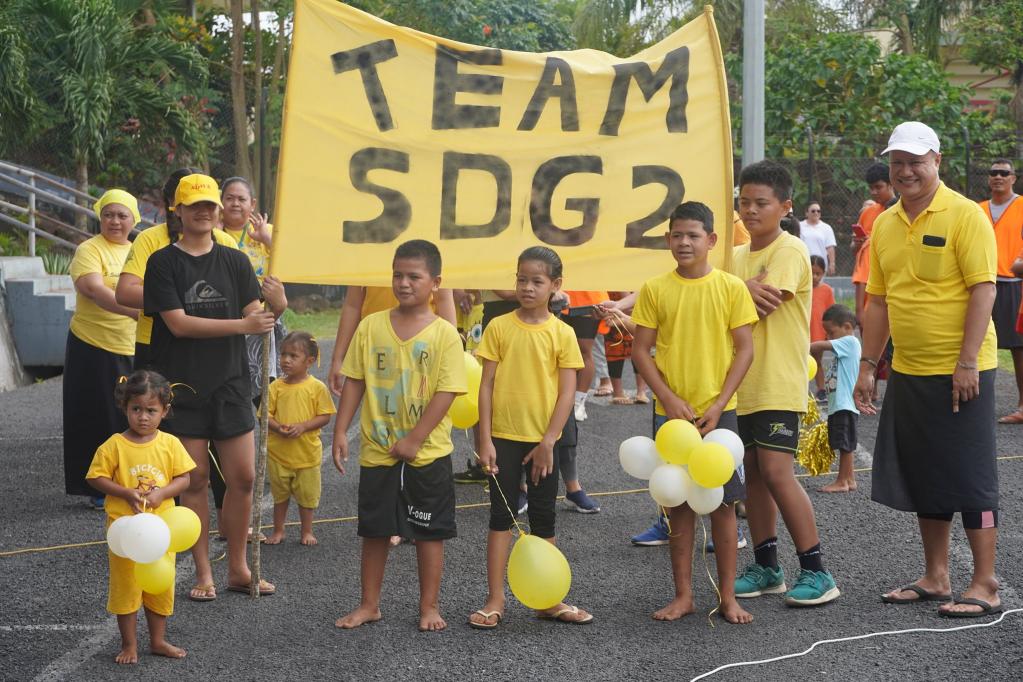
Story
17 September 2024
Solidarity in the voices of Samoa’s Youth to shape the change for their future.
Though weeks have passed, the authority in their voices still echoes across Samoa. On August 22nd and 23rd, the Lecture Halls of the National University of Samoa were filled with a palpable sense of purpose. Energetic, ambitious, and change-driven young leaders from civil society, youth with disabilities, local schools, church groups and government institutions came together for the Fono Lu'ulu'u a Tupulaga Samoa (Samoa Youth Fono), determined to make their voices heard. This was their moment to unite, be bold and shape the future of their nation by having a direct voice in addressing global challenges from their experiences and realities. The Youth Fono served as a localized forum, where these young Samoans engaged in discussions on issues such as climate change, global governance, digital transformation, peace and security which are some of the key themes of the Summit of the Future. In addition, the Youth Fono facilitated an exchange of inter-generational knowledge to equip the young participants with strategies and tools that they can use to contribute meaningfully to the global dialogue, while also reflecting the unique context of Samoa as a small island developing state that is bearing the brunt of various global challenges. As the 2-day gathering drew to a close, the unveiling of the Outcome Statement and presenting it to the UN Secretary General Antonio Guterres, was a powerful testament to the passion and energy of these young Samoans for a better future. Upon receiving the Outcome Statement, the UN Secretary General Antonio Guterres reiterated how crucial it is to mobilise youth all over the world to be able to tell those with responsibilities and power, that this is the moment to change. This Outcome Statement was not merely a summary of discussions but a bold reflection of the hopes, challenges, and collective voice of Samoa's youth. With their homeland being on the frontline of the global climate crisis, the youth spoke with determination about the need for immediate action. They pledged to lead the charge in building climate resilience and protecting their island, but their vision extended far beyond mere survival. They emphasized the importance of empowerment, calling for increased access to education, skills training, and entrepreneurial opportunities. They envisioned a future where young Samoans not only had jobs but thrived in a growing economy shaped by innovation and technology.Yet, even as they looked to the future, they were resolute in their commitment to preserving their cultural identity. The youth insisted that progress should not come at the cost of Fa’a Samoa. They saw technology and tradition as allies, with the digital economy offering new ways to celebrate and preserve their rich heritage.The Fono also called for greater youth involvement in leadership, demanding a seat at the decision-making table in key areas like peacebuilding and social welfare. The young leaders believed their voices and experiences were crucial to shaping policies that would benefit their communities. The UN Resident Coordinator (RC) and the Resident Coordinator’s Office (RCO) were instrumental in coordinating the event, working alongside the National University of Samoa and various UN agencies including UNICEF, UNFPA, UNESCO, UNEP, UN Women, FAO, and UNDP. This collaboration enabled young Samoans to voice their concerns and ideas for solutions presented in the Youth Fono Outcome Statement as their contribution to address the global challenges that are to be discussed in the UN Summit of the Future.Read more on the Outcome Statement.
1 of 5
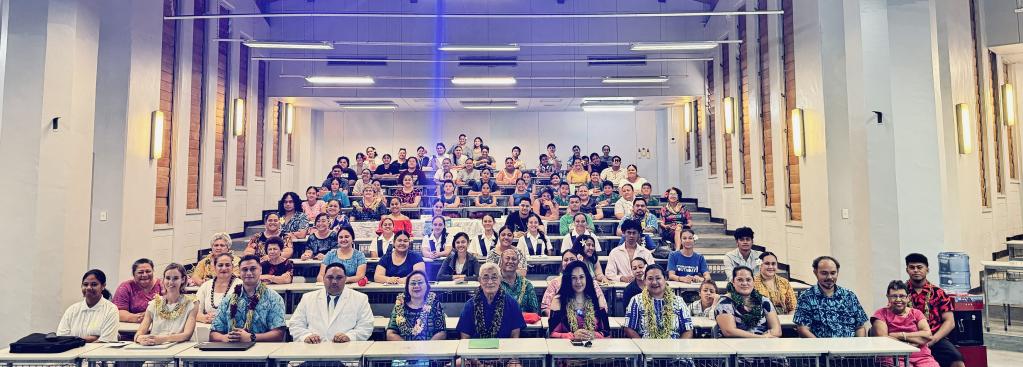
Press Release
10 November 2024
Samoa facing a surging plastic tide, warns UN expert
“At the receiving end of cheap plastic imports, pesticides that are banned in other countries, and used cars and tires, Samoa does not have financial, technical and human resources to deal adequately with and process all the waste that is being generated,” said Marcos Orellana, UN Special Rapporteur on toxics and human rights in a statement issued at the end of an official visit to the Independent State of Samoa.The expert said that while the Pacific region fights as much as it can against plastic pollution, States where plastic producers are based were not doing enough.The expert said that internationally, negotiations on a legally binding instrument on plastic pollution were taking the wrong turn. “Unfortunately, the non-paper 3 of the Chair of the Committee mandated to produce a legally binding instrument on plastic pollution, which was circulated ahead of its last scheduled meeting, risks shifting responsibility from plastic producing States to developing States that lack capacity or resources to confront the global plastic scourge,” Orellana said. “From what I could see during this visit, this shift will end being catastrophic for a number of countries especially small island states like Samoa”.He commended Samoa for its leadership in environmental issues, including its stance against deep sea mining, noting the importance of international and regional cooperation to meet the challenges of the triple planetary crisis: toxic pollution, climate change and the loss of biodiversity. “All people have the right to a clean, healthy and sustainable environment. As human rights and the environment are interdependent, a clean, healthy and sustainable environment is necessary for the full enjoyment of a wide range of human rights. At the same time, the enjoyment of all human rights, including the rights to information, participation and access to justice, is critical to the protection of the environment”, the expert said. He also recommended that the right to a clean, healthy and sustainable environment be guaranteed under the Constitution of Samoa. Orellana noted many promising practices, such as the Moana Taka scheme (a public-private partnership for transporting recyclable waste to countries with proper waste processing facilities). He also noted promising product stewardship plans, including a levy on beverage containers to incentivise collection and proper waste management. “The convenience of using pesticides in a country that is highly dependent on agriculture is understandable, but Samoa needs a plan to shift from highly dangerous pesticides to less dangerous ones and return to regenerative agricultural practices which are better for the people and the environment,” Orellana said. He called for an immediate ban on paraquat and glyphosate, which are widely used in Samoa, including in houses across villages. He criticised double standards of producer countries banning paraquat in their own countries, but allowing its production for export to others. “It seems that for these countries, life and health of people in recipient countries is not as important as their own citizens,” he said. At times, Paraquat has also been used for suicide in Samoa where mental health is a concern, including among youth.Orellana highlighted the problematic issue of importing secondhand cars and tires in a country that has no way of processing that type of waste. “The Tafaigata landfill in Upolu is reaching maximum capacity. Plastics, electronic waste, waste oil and used cars are piling up. What legacy will be left for future generations of Samoa?” the expert said. “Bringing in electrical vehicles may reduce gas emissions, but what will happen to their hazardous lithium batteries?”Addressing hazardous waste, plastics, pesticides and other toxic products in an environmentally sound manner requires awareness within communities about how exposure to toxic waste and chemicals impact health and the environment. This requires access to information and a shift in people’s behaviour, for which sustained and effective public campaigns and education starting in primary schools are paramount, the expert said. Orellana will present a report on his visit to the Human Rights Council in September 2025.ENDSThe expert: Marcos A. Orellana is the Special Rapporteur on the implications for human rights of the environmentally sound management and disposal of hazardous substances and wastes.The Special Rapporteurs are part of what is known as the Special Procedures of the Human Rights Council. Special Procedures, the largest body of independent experts in the UN Human Rights system, is the general name of the Council’s independent fact-finding and monitoring mechanisms that address either specific country situations or thematic issues in all parts of the world. Special Procedures’ experts work on a voluntary basis; they are not UN staff and do not receive a salary for their work. They are independent from any government or organization and serve in their individual capacity.UN Human Rights country page: SamoaFor more information and media requests please contact the mandate’s Secretariat: hrc-sr-toxicshr@un.org. For media inquiries related to other UN independent experts please contact Dharisha Indraguptha (dharisha.indraguptha@un.org) or John Newland (john.newland@un.org) Follow news related to the UN’s independent human rights experts on X: @UN_SPExperts.
1 of 5
Press Release
25 August 2024
UN Secretary General Remarks at the One UN House in Samoa.
Talofa,I thank the government and people of Samoa for their warm welcome and exceptional hospitality. It is a privilege to visit this beautiful island. To experience its rich culture. And to witness both its immense resilience and its extreme vulnerability.Samoa is a firm friend of the United Nations and an active supporter of multilateralism. I applaud your fierce advocacy for climate justice in international climate negotiations, and your commitment to the Sustainable Development Goals.Yet, like many Pacific countries, Samoa is caught in a storm of rising prices, rising seas, and rising geopolitical tensions – compounded by an ailing ocean and woefully insufficient finance. The average rate of sea level rise has more than doubled since the 1990s.Today's rate of increase is unprecedented in at least 3,000 years and likely, since the dawn of civilization, 12 000 years ago. During my visit, I spent time with communities threatened by the rising ocean. High and rising sea level pose an enormous threat to Samoa, the Pacific, and other Small Island Developing States. These challenges demand resolute international action.The climate crisis is the gravest threat facing this country and this region – and, quite possibly, the world.This region, the Pacific, contributes 0.02 per cent of global emissions.Yet you are on the front lines of the climate crisis, dealing with extreme weather events from raging tropical cyclones to record ocean heatwaves.Sea levels are rising even faster than the global average, posing an existential threat to millions of Pacific islanders. People are suffering. Economies are being battered.And entire territories face annihilation.The injustice is appalling.But Pacific islands are not only climate victims. They are leaders.And Samoa has built extraordinary resilience through Fa'asamoa.Many countries in this region are at the fore of ambition and action.And the world must match them.The fate of the Pacific depends on limiting the rise in global temperature to 1.5 degrees Celsius. We need the G20 – the biggest emitters – out in front:Phasing out fossil fuels – fairly.And ending fossil fuel expansion – immediately.All countries must produce new national climate action plans – or Nationally Determined Contributions – by next year, aligned with the 1.5-degree limit on global temperature increase.And we need climate justice – starting with major contributions to the new Loss and Damage fund, and ensuring that every person is protected by lifesaving early warning systems by [2027]. We also need a massive increase in finance.In Samoa, and around the world, lack of funds has put ambitious plans for climate action and sustainable development on hold.We need to simplify access to concessional finance and massively increase the sums available.We need to reform the Multilateral Development Banks, to massively increase their lending capacity and enable them to leverage far more private finance for development at affordable rates.We need action on debt – which is soaking up funds in many developing countries.We have just approved the multi-dimensional vulnerability index. Until no,w a country like Samoa that has huge challenges because it's a middle-income country would not be able to receive any form of concessional funding or any form of debt relief.And so we ask the international community to act in a way that when international financial institutions deal with countries like Samoa, the multi-dimensional vulnerability index is taking into account to allow for concessional funding to be granted for the projects that are necessary for this country to achieve the sustainable development goals and protect its populations against climate change.And we need all countries to honour their promises on climate finance, and a strong finance outcome from this year’s COP where we will discuss the financial commitments after 2025. We also need international action for the ocean.The beating heart of Pacific cultures and economies is being exploited, polluted, and degraded.Climate change, plastic, overfishing and waste are taking a terrible toll.Pacific nations lead the world in ocean stewardship.And globally, countries have now agreed on a better course.I urge all countries to ratify the recent international Agreement on Marine Biodiversity of Areas beyond National Jurisdiction – to give the ocean, and ocean people, a fighting chance.Dear friends of the media,Climate chaos brings its own security challenges. Meanwhile, international tensions are rising and interest in this region from major powers is mounting.The Pacific is best managed by Pacific islanders. It must never become a forum for geostrategic competition.I urge all countries to seize the chance presented at the Summit of the Future next month to revitalize multilateral institutions and re-boot multilateral solutions.We must equip our international system to meet today’s challenges.And we must push for greater representation – including of Pacific countries, especially in multilateral financial institutions.On all these issues – together – the United Nations stands with the Pacific in calling for justice and change.For global action to support the Blue Continent and the future of its people and take in particular consideration the need to massively increase the funding for adaptation of countries that are already suffering the dramatic impacts of climate change. This is the message I will carry with me to the Pacific Island Forum in Tonga and to the Summit of the Future and the General Assembly in New York.Thank you.
1 of 5
Press Release
26 January 2024
IOM Upscales Equipment for Enhanced Border Management in Samoa
Funded by the Government of Japan, IOM Samoa is currently implementing a regional project to assist the Pacific with the socio-economic recovery from the pandemic of COVID-19. With safe resumption of border management operations being the main approach, more integrated and seamless border control systems are therefore urgently needed.
During the handover ceremony, the Ambassador of Japan, HE Mr Keisuke Senta said, “I am happy to see the funding of the equipment for the Border Management System upgrades for Samoa Immigration through IOM has materialized in delivery. The Japanese government values the ongoing relations and supports the safety and prosperity of the Independent State of Samoa”.
With the capability to collect, process, store and analyze traveller information in real time, the upgraded border management system allows the officials to more effectively monitor the persons entering and exiting its territory. Additionally, it provides a sound statistical basis for migration-related policy planning. Apart from improving border control and law enforcement operations, the much-anticipated upgrade is also expected to facilitate the protection of migrants and evidence-based policymaking.
“This hardware is crucial to the implementation phases required for Samoa Immigration to ensure the border management system upgrades are rolled out as planned, especially considering the upcoming Commonwealth Heads of Government Meeting (CHOGM) in October 2024”, says Agafili Tomaimano Shem Leo, Chief Executive Officer of the Ministry of the Prime Minister and Cabinet. He also thanked the Government of Japan for the unwavering support and partnership the both countries have established over the years.
The donated servers will enable the Government of Samoa to handle the large volumes of data currently at hand. Meanwhile, it provides the Government with the sufficient storage capacity to facilitate accumulation of passenger and immigration related data in the years to come.
The upgrade will contribute to achieving the key strategic outcome 3: Security and Trusted Governance identified in the Pathway for the Development of Samoa (2021/22 – 2025/26). It will also help advance the agenda for the Peace and Security Thematic Area of the 2050 Strategy for the Blue Pacific Continent.
For more information, please contact Valavala Siaopo Pese, Assistant Chief Executive Officer, Immigration Division, at siaopo.pese@mpmc.gov.ws or Kazumi Nakamura at IOM Samoa Office at knakamura@iom.int.
SDG 10, 16 and 17
1 of 5
Press Release
04 May 2023
IOM Samoa Launches Project to Strengthen Border Control and Response to Infectious Diseases in Pacific Island Countries
Apia – Pacific socio-economic recovery from COVID-19 will be strengthened through safe resumption of border management operations and enhanced seamless border management infrastructure technology, equipment, and improved capacity.
As such, the International Organization for Migration (IOM) has launched a project to improve border control capacity and response to infectious diseases in Pacific Island Countries. The Government of Japan has provided over USD 6.9 million to fund the project, which will see IOM working closely with the Pacific Immigration Development Community (PIDC) and the Governments of the Republic of the Marshall Islands, the Federated States of Micronesia, Papua New Guinea, Samoa, the Kingdom of Tonga, Tuvalu, and Vanuatu.
Peseta Noumea Simi, Chief Executive Officer, Samoa Ministry of Foreign Affairs and Trade, said “we are a partner, a country, not just a recipient” at the event launch.
At the launch event, Ambassador of Japan to Samoa, Keisuke Senta, said “as the Pacific Immigration Development Community (PIDC) is located in Samoa, we are confident that Samoa will be a hub for this project. We firmly believe that the project will create opportunities for cooperation and exchange among border control authorities as well as to build a stronger sense of regional solidarity and resilience.”
The project also marks the opening of the IOM Country Office in Samoa. IOM is pleased to open the Samoa Country office to better support the Government of Samoa as well as Pacific regional bodies based in Samoa. Across the Pacific region, IOM supports the countries to contribute towards enhanced resilience, governance, and sustainable development in the context of human mobility in the Blue Pacific.
"IOM is committed to supporting Pacific Island Countries in strengthening their capacity to respond to infectious diseases and promote safe and orderly migration in the region. We sincerely thank the Government of Japan for providing the funding for this project and for their ongoing support to Pacific Island Countries.,” said Jacqueline Weekers, IOM Chief of Mission in Australia and coordinator to New Zealand and the Pacific.
On behalf of the United Nations Resident Coordinator, the UNDP Resident Representative, Jorn Sorensen, said “a positive probability of another pandemic dictates the need for a more proactive Pacific approach, not only to ensure mitigation of any future diseases, but also to dampen the potential negative economic fallout on the region”.
Notably, the project also aligns with the 2050 Strategy for the Blue Continent, which will contribute towards building a resilient Pacific Region of peace, harmony, security, social inclusion and prosperity, that ensures all Pacific peoples can lead free, healthy and productive lives.
See also the IOM Pacific Strategy 2022 - 2026 and this video for more information.
For more information, please contact Imogen Nicholls at IOM Australia Country Office with Coordinating Functions for the Pacific at inicholls@iom.int
1 of 5
Press Release
01 May 2023
Effective partnerships strengthen Births Registration, and Civil Registration & Vital Statistics system in Samoa
Apia, Samoa – This is reflected in the launch this week of a new report – Strengthening the Birth Registration System in Samoa – which highlights birth registration as a fundamental right, a critical first step for the protection and development of children, yet it remains a challenge for Samoa.
The Report is the result of effective partnerships between SBS, through its Births, Deaths and Marriages (BDM) Division, UNDP through its Accelerator Lab (AccLab), and relevant stakeholders such as the Ministry of Health, Ministry of Women, Community and Social Development, and actors involved in the birth registration process at the community level.
“The Samoa Bureau of Statistics recognizes and acknowledges the need to strengthen the birth registration system in the country. As such, birth registration is part of a wider civil registration system that includes the free and universal recording of the occurrence and characteristics of key events – births, deaths, adoptions, marriages, and divorces – and other civil status events pertaining to the population,” said Leota Laki Lamositele Sio, Minister of Statistics.
“In Samoa, every person has a right to a name that connects to the land and matai titles – their fa’asinomaga. The registration of birth protects and instills that right and identity, which enables entitlement to health, education, sports, employment opportunities and many other social and economic benefits. A child’s birth certificate is the primary identity to all social and economic entitlements.”
The Report provides a comprehensive analysis of the current situation, identifies gaps and opportunities, and proposes innovative and concrete recommendations like using collective intelligence, and leveraging technology and a whole-of-government collaboration across sectors to improve birth registration in Samoa.
“Birth registration and related information are key in ensuring effective development planning which benefits all, especially in a country like Samoa, which remains increasingly vulnerable to disasters. We hope this Report will serve as a valuable resource for policymakers, practitioners, and advocates working towards ensuring that every child in Samoa is registered and has access to their fundamental rights,” said Jorn Sorensen, UNDP Resident Representative.
Based on the success of the initial partnership, SBS and UNDP are continuing to the second phase of this initiative, partnering with the United Nations Children’s Fund (UNICEF), supported by the Government of New Zealand, to boost the Civil Registration and Vital Statistics (CRVS) system in Samoa.
“The right to identity is enshrined in the United Nations Convention on the Rights of the Child, which Samoa ratified in 1994. However, recent estimates by UNDP and UNICEF put the current birth registration rate in Samoa between 60 to 66%, yet more than 99% of children are delivered by a skilled birth attendant, which is quite alarming. We believe that through our revitalized and concerted effort, we can do better,” said Dr. Annefrida Kisesa-Mkusa, UNICEF Chief, Pacific Samoa Field Office.
Through participatory design approaches, the team will test and create a prototype of inclusive technologies in CRVS that have the potential to enhance public service delivery. They will also jointly work to revitalize a gender-responsive CRVS committee, co-facilitate policy dialogues and advocacy for open-source tools and open data to build responsive institutions, efficient public services and ensure citizen participation for inclusive development.
1 of 5
Latest Resources
1 / 11
Resources
10 November 2024
1 / 11

